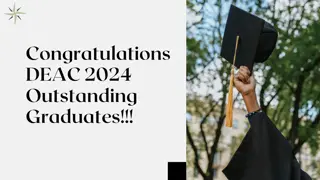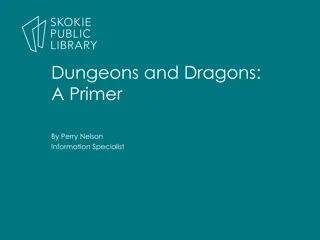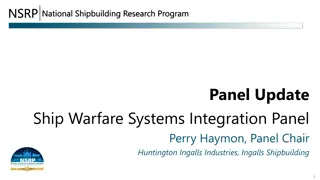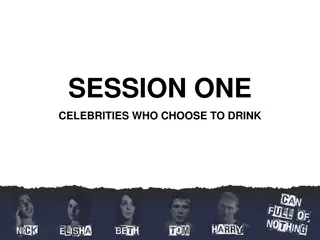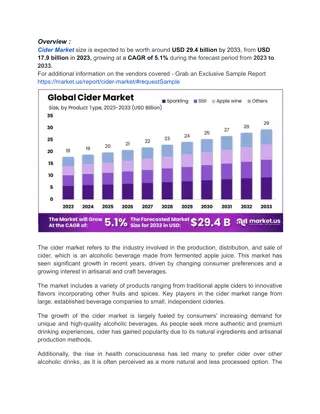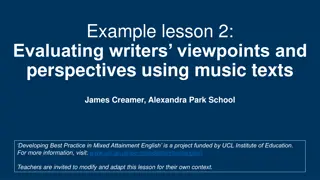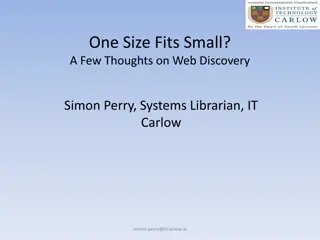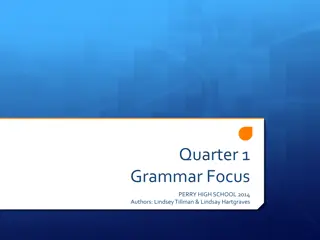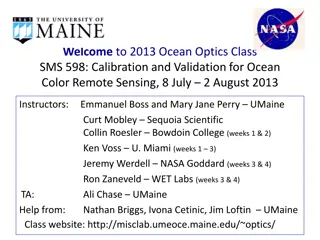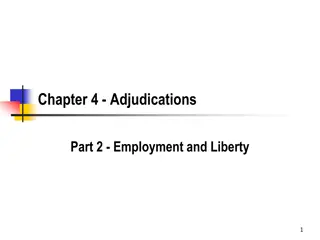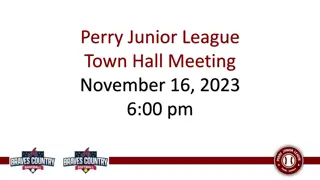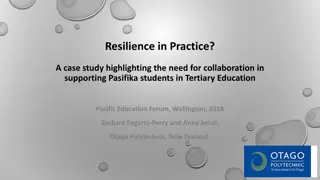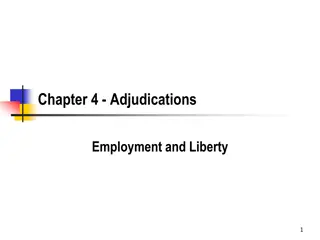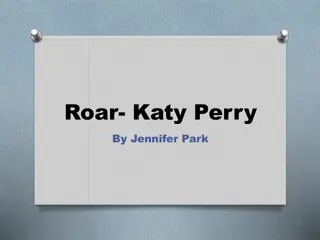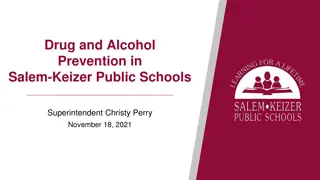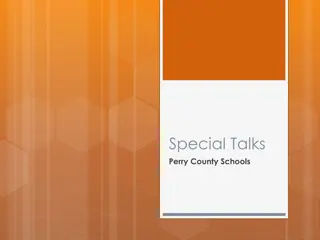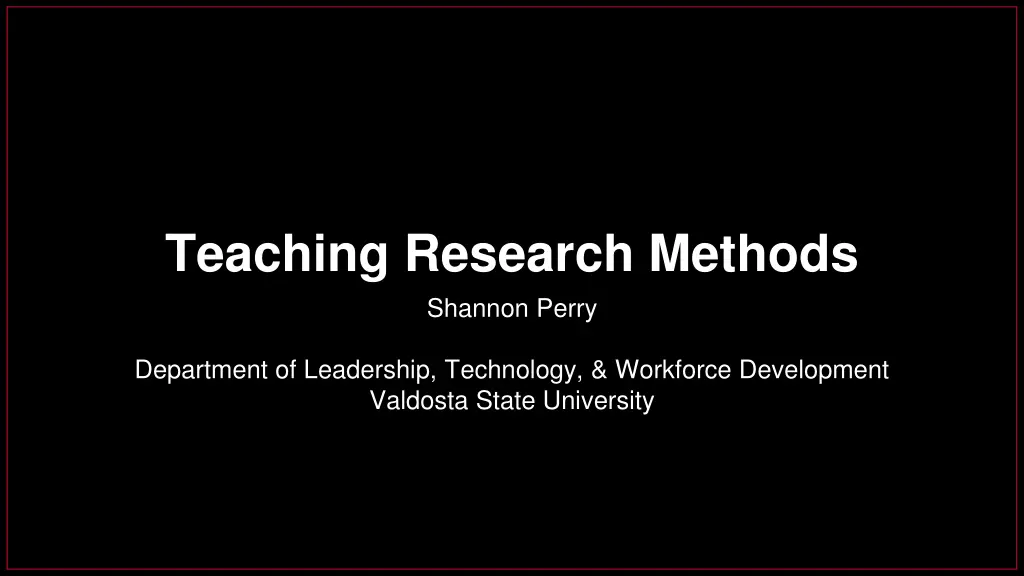
Effective Strategies for Teaching Research Methods to Adult Students
Explore innovative strategies for teaching research methods to adult learners, including facilitating online courses, conducting pre-class reflections, and utilizing research journals. Dive into the complexities of research design, epistemology, and building philosophical grounding to enhance the learning experience.
Download Presentation

Please find below an Image/Link to download the presentation.
The content on the website is provided AS IS for your information and personal use only. It may not be sold, licensed, or shared on other websites without obtaining consent from the author. If you encounter any issues during the download, it is possible that the publisher has removed the file from their server.
You are allowed to download the files provided on this website for personal or commercial use, subject to the condition that they are used lawfully. All files are the property of their respective owners.
The content on the website is provided AS IS for your information and personal use only. It may not be sold, licensed, or shared on other websites without obtaining consent from the author.
E N D
Presentation Transcript
Teaching Research Methods Shannon Perry Department of Leadership, Technology, & Workforce Development Valdosta State University
Objectives Discuss strategies I have used or plan to use with adult students learning research methods Unpack specific strategies for facilitating online courses
Pre-Class Reflection Purpose: Develop sense of students expectations and goals Understand students prior knowledge of qualitative research Create a plan for self-assessment Practice engaging in reflection How: Google Form
Pre-Class Reflection Sample Questions What are your academic, professional, and personal goals related to research? What prior knowledge or experience (if any) do you have about qualitative research? What are your expectations for this course? How can I best support you?
Research Design as Complex Ecology Goals position, cultural values, personal desires Validity epistemology subjective Maxwell, J. A. (2009). Designing a qualitative study. In The SAGE Handbook of Applied Social Research Methods (2nd ed., pp. 214-253). SAGE Publications, Inc., https://doi.org/10.4135/9781483348858
Research Journals When: Duration of the course Purpose: Develop reflexive capacity through research process Develop strong writing and reading habits Practice writing about theory How: Digital form of student s choice Assessment: Opportunity to share in class Two instructor checks during term
Epistemology Vestibulum congue Theoretical Framework Methodology Vestibulum congue Methods
Building Philosophical Grounding Crotty, M. J. (1998). The foundations of social research: Meaning and perspective in the research process Sage..
Mapping the Terrain Merriam, S. B., & Tisdell, E. J. (2015). Qualitative research: A guide to design and implementation. John Wiley & Sons.
Predict *Positivist Understand *Interpretive Emancipate *Critical Break Deconstruct *Poststructural New Inquiry Ontological Turn Immanence Post Qualitative Inquiry (St.Pierre) New Materialisms Mixed Methods Naturalistic Neomarxist Postmodern Constructivist < Feminist > Postcolonial Phenomenological Critical Race Theory Post critical New Empiricisms Symbolic Interactionist Praxis-oriented Posthumanist Affect Theory (Spinoza & Deleuze) Gay & Lesbian Theories Queer Theories Post Fordist Parrhesia (Kuntz) Divination (Maclure) Queer Theory Foucauldian Discourse Analysis Ethico-onto- epistemology (e.g., Barad) Minor Inquiry (Mazzei) Postparadigmatic Diaspora (John Caputo) Post-everything (Fred Erickson) Thought without Method (Jackson) Lather, P., & St. Pierre, E. A. (2007). Postpositivist new paradigm inquiry. In P. Lather, Getting lost: Feminist efforts toward a double(d) science (p. 164). Albany: State University of New York Press.
Research Design Possibilities Activity Theoretical Vestibulum congue Epistemology Vestibulum congue Methodology Vestibulum congue Methods Vestibulum congue Framework
Analyzing Research Questions Activity Which epistemological paradigm(s) or theoretical perspective(s) (Merriam & Tisdell, 2015) might the following research question align with? How do teachers of African American students in urban elementary schools in the South implement culturally relevant pedagogy? Mathews (2024)
Concept Mapping Purpose: Develop ecological or systems understandings Clarifying definitions and concepts Uncover potential new connections or elements Mapping different types of relations Practice visual literacy How: Paper & pencil/markers or with digitally with Miro, Mindmap or other tool
Playing with Modes of Thinking in Analysis Categorical Dialectical Narrative Poetical Diagrammatical / cartographic Freeman, M. (2016). Modes of thinking for qualitative data analysis. Routledge.
Developing Learning Community Online Relational rituals (writing, sharing work) Cultivating belonging with diverse course material selection Group activities and assignments o Breakout rooms o Informal and peer learning Guest scholar interview Collaborative and individual activities and assignments for developing digital literacy
Synchronous Activities for Practice and Play Giving and receiving feedback on work The Listening Guide activity Slow observing (Mol, 2021) Playing with theme-ing and coding approaches Collaborative blackout poetry
Authentic Research Activities and Assignments Digital media creation Visual and sound collaging Digital poster research proposal Curating an archive Podcasting / blogging / online publishing Collaborative annotated bibliography Opportunities for student facilitation Teach a research tradition or method Research methodology book club Research design poster presentations
Inquiry is a 21st century career literacy. a social technology for transformative learning. enacting leadership. lifelong learning. key to building learning cultures.
Collaborative Inquiry Pedagogical method for creating self-generating learning cultures Emphasizes affective experiencing and expressions of aesthetic knowing Practices mutuality and co-creation Leading to transformations of being, knowing, and doing
Building Affective Capacity Critical subjectivity prerequisite to critical dialogue Relational perception (e.g., Buber s I-Thou, Barad s intra-action, Braidotti s we are in this together but we are not one and the same ) Receiving and interpreting embodied feedback (e.g., anxiety, wonder)
Four Parts of Speech 1. Framing the situation or challenge. 2. Advocating a specific approach or way forward. 3. Illustrating potential outcomes of following or not pursuing the suggested approach. 4. Inquiring in order to learn and find other perspectives. Torbert, W. R. (2004). Action inquiry: The secret of timely and transforming leadership. Berrett-Koehler Publishers.
Four Parts of Speech Activity Using Torbert s (2004) four parts of speech (framing, advocating, illustrating, and inquiring), prepare a short four sentence paragraph or speech inquiring about creating a new course or departmental initiative. Torbert, W. R. (2004). Action inquiry: The secret of timely and transforming leadership. Berrett-Koehler Publishers.
La Selva (Sound Environments from a Neotropical Rain Forest) Slow Listening Reflection What do you hear? How do you feel in this sonic reality? Sharing revealing complexity and nuance
Affective Relational Strategies Relational whole personhood = interdependence Opening check-ins (connections game, high-low) Fostering expressive ways of knowing Affective storytelling pedagogy (Kathleen Stewart)
Authentic Assignments Focusing Digital Literacies Emphasis on playing with web platforms and digital tools Teaching/leading learning philosophy videos Blogging scholar-practitioner work Participating in peer review processes Collaborative writing Online facilitation practice Creating multimedia instructional media Creating collaborative digital documents
Relational learning Meaningful work Inquiry-based (w)holistic pedagogy Affective digital interactions and multimedia materials Responsive and responsible action Lifelong and life-wide learning
Thank you! Questions?

